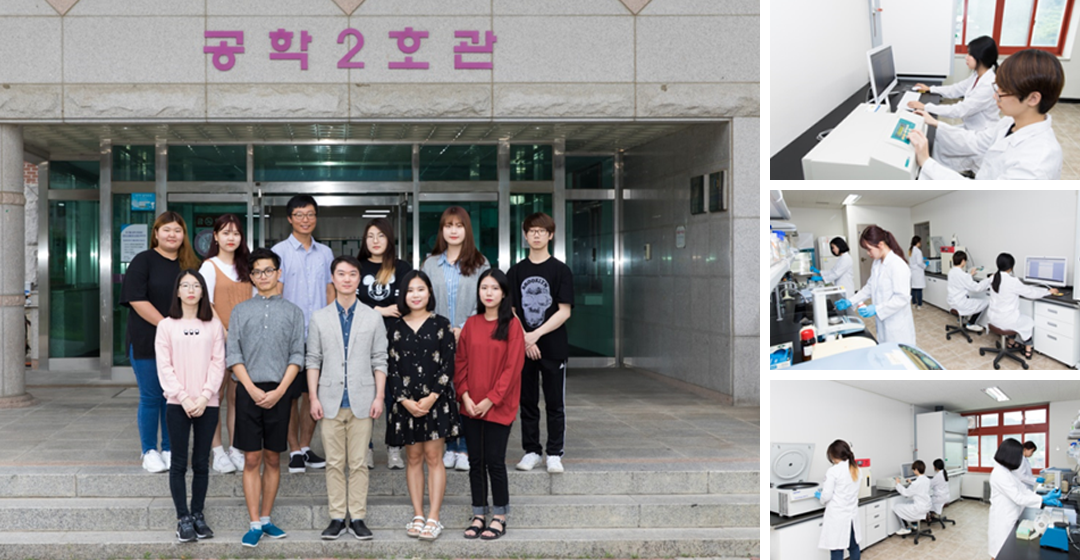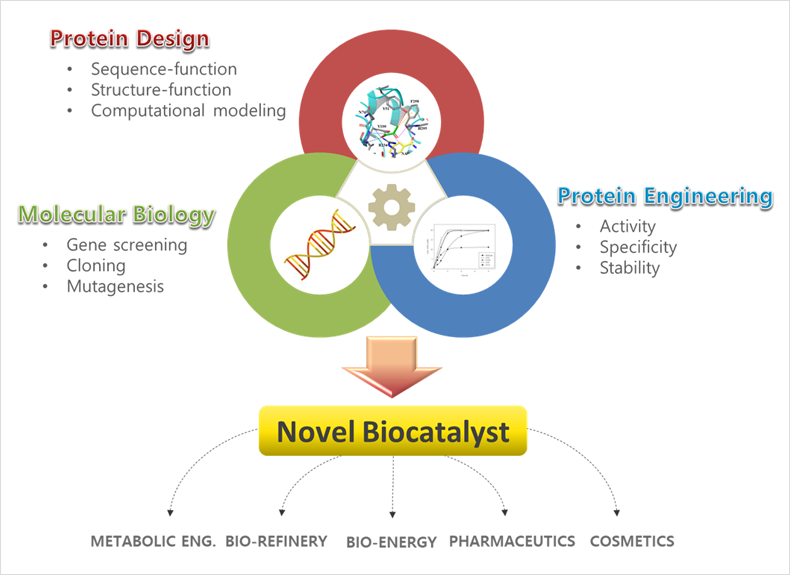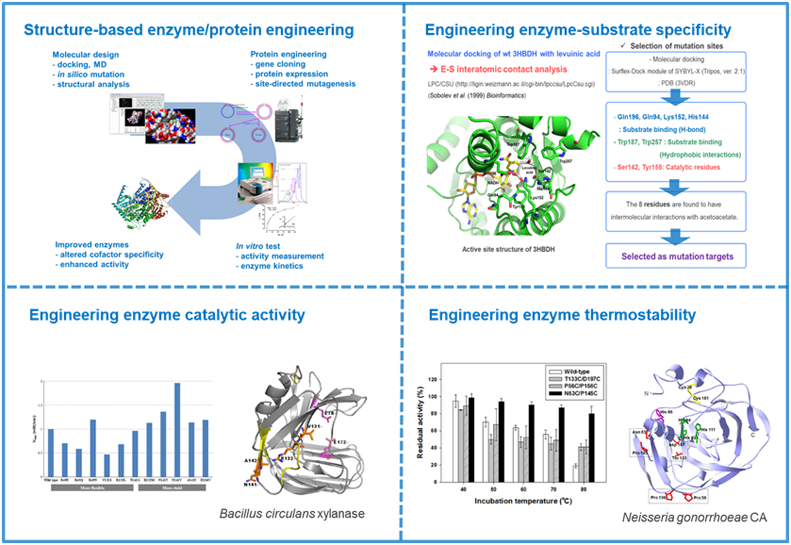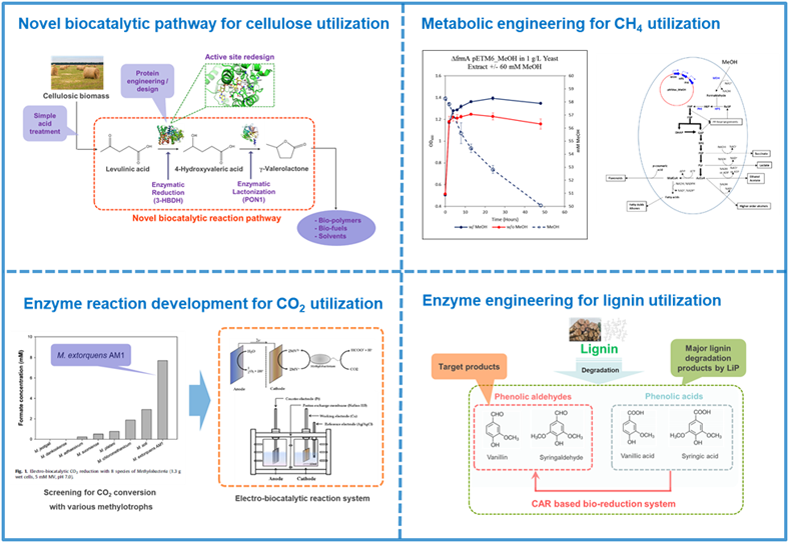Biomolecular EngineeringLaboratory
Department of Biochemical Engineering
Gangneung-Wonju National University
7, Jukheon-gil,Gangneung-si, Gangwon-do, 25457,
Republic of Korea

서울대학교 화학생물공학부 박사
서울대학교 응용화학부석사
연세대학교 화학공학과학사
| 기간 | 기관명 | 직위 및 직급 |
|---|---|---|
| 2016. 9. – 현재 | 강릉원주대학교 생명화학공학과 | 조교수 |
| 2016. 3. – 2016. 8. | Department of Chemical & Biomolecular Engineering, University of Delaware | Postdoc 연구원 |
| 2015. 10. – 2016. 3. | 광운대학교 화학공학과 | Postdoc 연구원 |
| 2014. 10. – 2015. 9. | 서울대학교 유전공학연구소 | Postdoc 연구원 |
| 2008. 8. – 2010. 1. | 삼성 SDI 케미칼연구소 | 선임연구원 |
| 2005. 3. – 2006. 5. | LG화학 기술연구원 공정연구소 | 대리 |
| 2002. 3. – 2005. 3. | (주)디엔에이링크 | 연구원 |

본 연구실은 분자생물학 및 단백질공학적 접근을 기반으로 단백질의 분자모델링/ 설계를 통해 효소의 활성(activity), 안정성(stability), 기질특이성(specificity) 등을 개량하는 연구를 수행한다. 개량된 효소는 대사공학, 바이오화학, 바이오에너지, 바이오의약, 화장품원료 등의 다양한 응용분야에 적용 가능하며, 특히 환경친화적이고 지속가능한 바이오공정 개발을 위해 재생가능한 원료 (cellulose, lignin, C1 gas 등)로부터 고부가가치 물질을 생산하는 신규 바이오촉매 공정의 개발에 연구의 초점을 맞추고 있다.

구조기반 분자모델링(Molecular docking, Molecular dynamics 등) 기술을 통해 효소/단백질 설계 전략을 수립한 후 단백질공학 기술을 적용하여 효소의 활성, 안정성 및 기질특이성 등의 기능을 향상시키는 연구를 수행한다. Xylanase, lipase, carbonic anhydrase, 3-hydroxy butyrate dehydrogenase, succinic semialdehyde reductase, carboxylic acid reductase, paraoxonase, formate dehydrogenase, D-lacate dehydrogenase, alcohol dehydrogenase, tyrosinase, lysine decarboxylase, Baeyer-Villiger monolxygenase 등의 다양한 효소들에 대한 연구를 수행해 왔으며, 분자모델링 기술과 함께 유전자클로닝, 단백질/효소 발현, 정제 및 개량, 효소 동력학 분석, 전세포반응등의 실험을 함께 수행하여 산업적으로 적용할 수 있는 유용한 효소를 발굴하고 개량하는 연구를 수행한다.
 <구조기반 단백질/효소설계 및 개량 연구: 효소 활성, 안정성 및 기질특이성 개량>
<구조기반 단백질/효소설계 및 개량 연구: 효소 활성, 안정성 및 기질특이성 개량>
산업적으로 유용한 다양한 고부가 물질의 생산을 목적으로 신규 생합성 경로를 개발하는 연구를 수행한다. 환경친화적이고 지속가능한 바이오공정의 개발을 목적으로, 바이오매스 (셀룰로오스, 리그닌) 및 C1가스 (CO, CO2, CH4)등의 재생가능한 원료 물질을기질로 바이오에너지, 바이오플라스틱, 의약품, 기능성화학물질 등의 고부가 물질로 전환하는 신규 바이오 공정을 개발하고자한다. 단백질/효소공학을 기반으로 전세포반응, 대사공학 및 균주개발 등의 연구와 연계하여 연구를 수행하며, 4-hydroxyvaleric acid, 4-valerolactone, 3-phenyllactic acid, 1,2-propane diol, mevalonic acid, vanillin, syringaldehyde등의 다양한 고부가 물질의 생산을 목표로 연구를 진행하고 있다.
 <신규 바이오촉매 전환반응 개발: 바이오매스 및 C1가스로부터 고부가 화학물질 및 연료 생산>
<신규 바이오촉매 전환반응 개발: 바이오매스 및 C1가스로부터 고부가 화학물질 및 연료 생산>